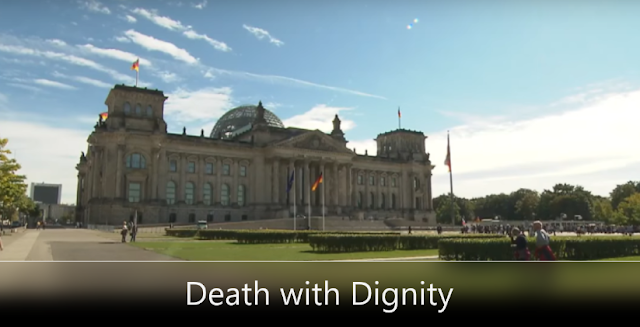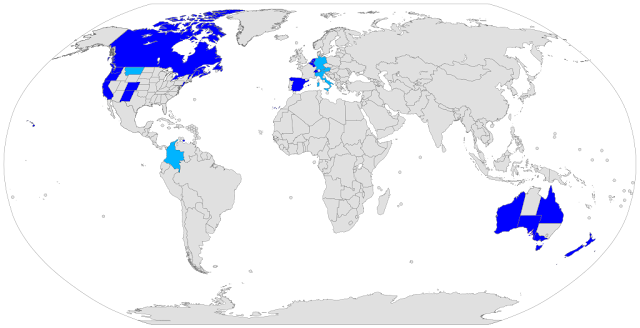Why do we allow pets death with dignity but not ourselves?
First of all I want to stress that we must do anything and everything what we can do in order to improve others life, but we must not leave people alone - people who are in chronic pain, suffer pain, loosing abilities, loosing sovereignty and autonomy of their life. Yes, Our attention must be focused on life, and our efforts must be toward improving it. Our compassion and human understanding should guide our steps toward the goal of life with dignity. But as well a clear and human and dignity centered YES for death with dignity for each individual.
Animals can die in dignity - but not a human
My wife and I we had a horse farm - I raced for about 20 years sled dogs - and we had donkeys, cats and other animals. And when you had or have a pet, and this animal have an incurable illness and every day life is painful for them, we make the decision to have them put to sleep, even though it is heartbreaking to do so for us. But what counts is not our feelings - what counts is the suffering animal.
If an animal has this right, why don’t humans? Exactly this was one of my wife's questions and statements - why she want a death in dignity. We say and hear all too often that humans are meant to be the highest life form - but in so many countries or in most countries of our world it is humans not allowed to decide about their own life - and it is not allowed to ask for help in this challenging time.
Even if this 'highest life form' knows that they will be facing the possibility of constant pain, pain that is only dulled by the strongest pain killers doctors can offer (which has another whole round of side effects); the loss of their bodily functions and thus their dignity; and watching (and feeling) their body waste away, all the while knowing they are only going to get worse and worse until they finally die - and other 'highest life forms' want to determine the suffering people that suffering a painful death what is human and ethical correct. And loved ones have to watch this person slowly getting weaker and each day slipping closer to death, yet being unable to do anything about it but watch.
Another Perspective
Think about a healthy person who has a serious accident, becoming severely brain damaged, basically a vegetable – unable to move or perform even the minutest of tasks for themselves. Unable to think or speak, they need constant care, and could be thought of as a burden on society. What kind of a quality of life is this? And for such a case it is important to have a advance decision / advance directive. If there is absolutely no hope for this person, if several different doctors are in agreement that this person will never get better, that their brain function is non-existent and they have been damaged beyond repair, shouldn’t this person be allowed to die, if the family is in agreement that dying in peace and self-determined is the best option? Or even better as I mentioned - if this person has an advance directive. How is lying flat on your back in a hospital bed, every day for the rest of your life, being fed through a tube, having no control over bodily functions, not being able to move; how is this actually living? Just because the person is breathing, does not mean they are living. I believe it is more cruel to keep someone in this situation alive, than it is to help them die.
Why certain people, upholder of religious or moral standards believe that a self-determined way of dying should be forbidden
Religious opponents of a self-determined way of dying believe that life is given by God, and only God should decide when to end it. Other opponents fear that if assistance with a self-determined end of life was made legal, the laws regulating it would be abused, and people would be killed who didn't really want to die.
The legal position - assistance with a self-determined end of life is illegal in most countries, although doctors do sometimes carry out such assistance even where it is illegal. I can even can not remember and count how often I observed in my years as paramedic at bad, serious, major accident or in my months in combat.
Final thought
I firmly believe that a self-determined way of dying is a basic human right. And I think that dying in peace and with dignity is much more than ethical and it should be recognized as such. I would want to die with dignity, before my body is maimed by disease or after an accident; before I have to suffer unnecessary pain; before my loved ones have to watch me waste away.
Think about it for a moment.
- What if it would be you?
- Would you want to be allowed to die with your dignity?
- Or would you rather your death was prolonged, trying every procedure known to man to try and cure what is incurable, barely clinging to life!?
- Or what consists of your life? Simply a life form, but being unable to truly “live”?
In context to this - I already wrote following articles:
- Right to a Self-determined Death - an article I wrote a few month after my wife died in peace on her own will
- Autonomy how to live and how to die
- What does peace mean to you? Inner Peace, Happiness and Satisfaction
- Overview of assisted suicide (Belgium, Canada, Germany, Luxembourg, Netherlands, Spain, Switzerland, United States) last update September 2021
A few basic knowledge every one should have;
Four types of death with dignity - you need to know:
Assisted suicide / Assisted dying:
Assisted suicide is suicide undertaken with the aid of another person - the person who want to die is actually performing the final act. In assisted suicide, the physician intentionally gives the patients the means to take the lethal medication themselves. It can be that this means that the patient drinks the lethal medication or starts and open an intravenous roller clamp. For Assisted suicide, it is super important, that the patient is the one who commits the final act that directly causes death.
Assisted dying:
This is a sub-term of assisted suicide but is only used in the context of when a patient who is already dying, i.e. terminally ill, asks for help to die. Assisted dying is not usually used in the context of bringing about the deaths of patients who are not already dying - for example, paralysed patients or those who have found out that they have developed a condition in the future.
Active Physician-Assisted Dying:
when the acting person deliberately intervenes to end someone’s life. For example – a Doctor who injects a patient with terminal cancer an overdose of muscle relaxants to end their life would be considered to have carried out active act of assisted action.
Passive Physician-Assisted Dying:
where a person causes death by withholding or withdrawing treatment that is necessary to maintain life.
Sidenote (March 31st 2022) - Alain Delon want to die in dignity
I read the news that the legendary French 86-year-old actor Alain Delon has asked to undergo assisted suicide.In 2019 he already suffered a stroke and was treated in a hospital in Switzerland. In 2021, in an interview, he said: “Euthanasia is the most logical and natural thing to do and he said as well “From a certain age and time, we have the right to depart peacefully from this world without the support of a hospital or life support devices.”






If you like - Please send me your comment, or suggestion you may have.
ReplyDeleteI will not publish the comments. If you want a reply please don't forget to leave your contact information.
Sie / Ihr könnt gerne Kommentieren - Kommentare werden nicht veröffentlicht!
Aber wenn Du / Ihr eine Antwort erwartet bitte hinterlasst auch eine Email-Adresse - Danke